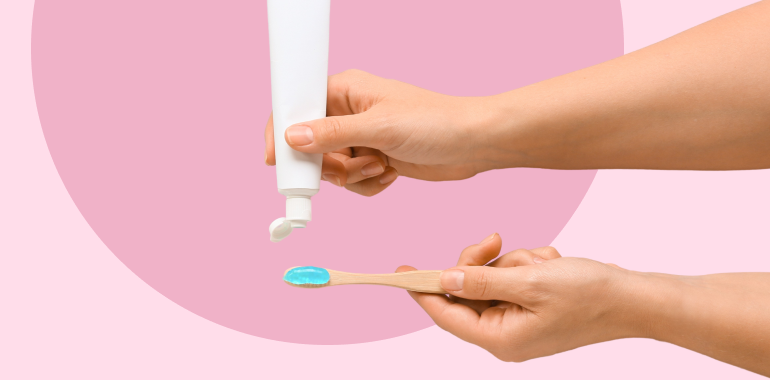Table Of Contents
Brushing Teeth During Fasting: What You Need to Know
Maintaining good oral hygiene during fasting periods is essential for both health and comfort. Many people wonder if brushing teeth, using mouthwash, or chewing gum might break their fast. This article explores the relationship between dental care and fasting, providing practical advice for keeping your mouth fresh without compromising your fasting goals.
Key takeaways: Brushing your teeth generally doesn’t break a fast if you avoid swallowing toothpaste. Most toothpastes contain minimal to no calories. Sugar-free gum and mouthwash might affect fasting depending on your specific fasting protocol. Bad breath during fasting is common but manageable with proper oral care techniques.
Does Brushing Teeth Break Your Fast?
Brushing your teeth typically doesn’t break a fast as long as you don’t swallow significant amounts of toothpaste. The minimal exposure to ingredients in toothpaste that might occur during normal brushing isn’t enough to trigger metabolic processes that would interrupt your fasting state.
However, the type of fast you’re following matters. For religious fasts with strict rules about not consuming anything, even water, you might need to be more cautious about how you brush. In these cases, using minimal toothpaste and being careful not to swallow can help maintain your fast’s integrity.
For intermittent fasting focused on metabolic benefits, the tiny amount of ingredients potentially absorbed during brushing has negligible impact on your fasting state. The health benefits of maintaining oral hygiene far outweigh any theoretical concerns about breaking your fast.
The Connection Between Oral Hygiene and Fasting
Fasting creates unique conditions in your mouth that make oral care particularly important. When you fast, saliva production decreases, which can lead to dry mouth and increased bacterial growth. This environment often results in bad breath (halitosis) and potentially increases the risk of dental problems.

Regular brushing during fasting periods helps remove bacteria and food particles that might otherwise accumulate. This is especially important during a fast when the natural cleaning action of eating crunchy foods and drinking water throughout the day is absent.
Beyond hygiene, brushing your teeth during a fast can serve as a psychological marker that reinforces your commitment to the fasting practice. The fresh feeling after brushing can help reduce food cravings and provide a sense of cleanliness that supports your fasting goals.
Also, read – What is 16/8 Intermittent Fasting?
Why Oral Care Matters During Fasting Periods
Fasting creates several changes in your mouth that make dental care even more crucial than usual. Reduced saliva flow during fasting means less natural protection against bacteria and acid. This can lead to increased plaque formation, potential tooth decay, and gum problems if oral hygiene is neglected.
Bad breath is a common complaint during fasting, caused by the breakdown of fats creating ketones (during ketosis), dry mouth, and bacterial buildup. Regular brushing, flossing, and tongue cleaning can significantly reduce these issues, making your fasting experience more comfortable for both you and those around you.
Maintaining oral care routines during fasting also helps preserve dental health long-term. Skipping brushing for extended periods, even during temporary fasting, can contribute to dental problems that might require intervention later. The discomfort of dental issues could potentially make adhering to future fasting protocols more difficult.
Toothpaste Ingredients and Their Impact on Fasting
Most commercial toothpastes contain several ingredients that might raise questions for those fasting. These typically include sweeteners, flavorings, and additives that give toothpaste its pleasant taste and texture. However, the amounts of these ingredients that might be accidentally ingested during normal brushing are minimal.
Some toothpastes contain sweeteners like xylitol or sorbitol, which technically have caloric value. These sugar alcohols might theoretically trigger insulin responses if consumed in significant quantities. However, the trace amounts potentially absorbed during brushing are unlikely to meaningfully impact metabolic state or break a fast.
For those concerned about even minimal exposure, several options exist. Plain baking soda (sodium bicarbonate) can serve as a simple alternative to commercial toothpastes. Unflavored, unsweetened toothpastes are also available, though they may lack the palatability of standard varieties. Ultimately, the decision depends on how strictly you define your fasting protocol and its purpose.
Does Toothpaste Have Calories? The Truth About Dental Products
Technically speaking, most toothpastes do contain minimal caloric content, primarily from sweeteners and flavoring agents. However, the amount is extremely small – typically less than one calorie per brushing. Since toothpaste isn’t considered a food product, manufacturers aren’t required to list caloric information on packaging.
Does toothpaste have calories that would impact fasting? The answer is practically no. The amount potentially swallowed during normal brushing is so minuscule that it won’t significantly affect your metabolic state or interfere with the benefits of fasting. Even the most stringent caloric restriction protocols typically allow for such negligible amounts.
For context, most fasting protocols that focus on metabolic benefits consider consuming under 50 calories as maintaining the fasted state. The trace amounts of toothpaste that might be accidentally ingested fall far below this threshold, making brushing teeth compatible with fasting from a caloric perspective.
Also, read – Intermittent Fasting vs. Calorie Restriction: Which is Better?
Choosing the Right Toothpaste for Fasting
If you’re concerned about breaking your fast while brushing, consider these factors when selecting toothpaste. Look for products with minimal sweeteners and simplified ingredient lists. Natural toothpastes often contain fewer artificial additives that might potentially trigger insulin responses.
For religious fasting where even trace amounts of consumed substances matter, unflavored toothpastes or traditional cleaning methods like miswak (a natural toothbrush stick) might be appropriate. These options reduce the chance of accidentally swallowing flavored compounds while still maintaining oral hygiene.
- Avoid toothpastes with sugar or glucose-containing ingredients
- Consider natural toothpastes with minimal additives
- Look for products specifically marketed as unflavored or unsweetened
- Use smaller amounts of toothpaste to minimize potential ingestion
Remember that proper brushing technique matters too. Focusing on thorough brushing while minimizing swallowing can help maintain your fast’s integrity while still getting the benefits of good oral hygiene.
Does Mouthwash Break a Fast? Analyzing the Evidence
The question of whether does mouthwash break a fast depends largely on the type of mouthwash and your fasting protocol. Most commercial mouthwashes contain small amounts of alcohol and flavoring agents, but like toothpaste, the quantities potentially absorbed during normal use are minimal.
Some mouthwashes contain xylitol or other sweeteners that theoretically could trigger minimal insulin responses. However, the amount that might be absorbed through the tissues in your mouth during brief rinsing is unlikely to significantly impact metabolic processes or the benefits of fasting.
For those practicing religious fasts with strict rules against consuming anything, even inadvertently, alcohol-free and unflavored mouthwash options are available. Alternatively, a simple salt water rinse can help freshen breath and kill bacteria without introducing potentially problematic ingredients.
Most evidence suggests that standard mouthwash use during fasting is unlikely to meaningfully impact fasting benefits. The brief exposure to minimal amounts of ingredients doesn’t appear to significantly affect metabolic state or autophagy processes that many seek from fasting.

Sugar-Free Gum and Fasting: What Science Says
Sugar-free gum presents more complex considerations for fasting than brushing teeth. While it contains minimal calories, the act of chewing and the presence of sweeteners might potentially impact fasting in several ways.
Research suggests that even artificial sweeteners might trigger certain insulin responses in some individuals. A study published in the journal PubMed indicates that non-caloric sweeteners can potentially impact insulin and blood sugar levels, though the significance of these effects varies widely among individuals.
Chewing itself can trigger digestive processes, as the physical action signals to your body that food is coming. This might initiate certain digestive secretions and hormonal responses that could theoretically affect fasting benefits, particularly those related to giving your digestive system a complete rest.
For strict fasting protocols aimed at maximizing autophagy or complete metabolic rest, avoiding sugar-free gum is likely prudent. For less stringent approaches like time-restricted eating focused primarily on calorie control, the impact of occasionally chewing sugar-free gum is probably minimal.
Also, read – Intermittent Fasting and Alcohol: Can I Drink While I Fast?
Bad Breath When Fasting: Causes and Solutions
Bad breath during fasting is extremely common and stems from several physiological changes. When fasting, your body eventually enters ketosis, producing ketone bodies that can create a distinctive breath odor often described as fruity or acetone-like. Reduced saliva flow during fasting also means less natural cleansing of the mouth, allowing bacteria to multiply and produce sulfur compounds that cause unpleasant odors.
Addressing fasting-related bad breath requires a multi-faceted approach:
- Brush your teeth, tongue, and gums at least twice daily
- Stay hydrated with water during eating windows (or throughout, for intermittent fasting)
- Use a tongue scraper to remove bacteria from the tongue surface
- Consider alcohol-free mouthwash for temporary relief
For ketosis-related breath issues, the odor typically diminishes over time as your body becomes more efficient at utilizing ketones. Until then, maintaining diligent oral hygiene is your best defense against fasting breath.
Practical Tips for Maintaining Oral Hygiene While Fasting
Maintaining excellent oral hygiene during fasting requires some adjustments to your routine. I recommend brushing more frequently than usual – potentially three times daily instead of the standard twice – to compensate for reduced natural mouth cleansing that occurs when you’re not eating regularly.
Timing your brushing strategically can maximize benefits while respecting fasting protocols. Brush after your final meal before beginning your fast, and again first thing in the morning. For intermittent fasting, also brush shortly before breaking your fast to remove accumulated bacteria.
Hydration plays a crucial role in oral health during fasting. If your fasting protocol permits water (as most intermittent fasting approaches do), drink water regularly to help combat dry mouth and rinse away bacteria. This simple step significantly reduces bad breath and supports overall oral health.
Consider incorporating alcohol-free mouthwash or salt water rinses between brushings for additional freshness without potentially problematic ingredients. These approaches can provide temporary relief from bad breath without significantly impacting your fasting state.
Best Practices for Brushing Teeth Without Breaking Your Fast
To brush teeth during fasting with minimal risk of breaking your fast, follow these specific techniques. Use a pea-sized amount of toothpaste to reduce the potential for accidental swallowing. Lean forward slightly while brushing to help any toothpaste foam naturally fall forward rather than toward your throat.
Rinse thoroughly but carefully after brushing, avoiding swallowing the rinse water. Spit out rinse water completely, and consider rinsing multiple times to ensure all toothpaste residue is removed from your mouth.
For those following particularly strict fasting protocols, brushing with water alone or with a minimal amount of baking soda can provide mechanical cleaning without introducing flavored compounds. While less pleasant than standard toothpaste, this approach minimizes any risk of breaking your fast.
Pay special attention to tongue cleaning during fasting periods. A significant portion of bad breath originates from bacteria on the tongue surface, and thorough tongue cleaning can substantially improve breath freshness without requiring additional products that might concern those fasting.
Religious Perspectives on Oral Care During Fasting
Different religious traditions have varying interpretations regarding oral care during fasting periods. In Islam, most scholars permit brushing teeth during Ramadan fasting, though some recommend using miswak (siwak) – a natural toothbrush stick – rather than toothpaste to avoid accidentally swallowing anything.
For Orthodox Christian fasting traditions, particularly during periods like Great Lent, brushing teeth is typically permitted without restriction. The focus is primarily on food abstention rather than concerns about trace amounts of substances that might be inadvertently consumed during dental care.
Jewish fasting observances, such as Yom Kippur, generally prohibit eating and drinking but do not explicitly forbid tooth brushing. However, some stricter interpretations advise against using toothpaste due to its pleasant taste, suggesting plain water brushing instead.
Across religious traditions, the consensus generally leans toward permitting basic oral hygiene during fasting, with variations in how stringently the rules around potential ingestion of toothpaste are interpreted. When in doubt, consulting with religious authorities specific to your tradition can provide clarity.
Final Verdict: Can You Brush Your Teeth While Fasting?
After examining the evidence and various perspectives, the clear answer is: yes, you can and should brush your teeth while fasting. The health benefits of maintaining oral hygiene far outweigh any theoretical concerns about breaking your fast through minimal exposure to toothpaste ingredients.
For most fasting approaches focused on metabolic health, weight management, or general wellness, standard tooth brushing has negligible impact on your fasting state. The tiny amount of toothpaste that might be inadvertently consumed doesn’t meaningfully affect insulin levels, autophagy, or other biological processes sought through fasting.
For those following religious fasting traditions with stricter interpretations, simple adjustments like using less toothpaste, opting for unflavored varieties, or using traditional cleaning methods can help maintain both spiritual observance and oral health. The key is finding an approach that respects your specific fasting goals while not neglecting dental hygiene.
Ultimately, oral care during fasting represents a balance between health priorities. Regular brushing, flossing, and tongue cleaning help make fasting more comfortable, sustainable, and compatible with long-term health goals. With minimal precautions to avoid swallowing toothpaste, you can maintain fresh breath and healthy teeth throughout your fasting journey.
My name is Barbara Kovalenko. I hold a Bachelor's degree in Human Nutrition from Bogomolets National Medical University in Ukraine and a Master's degree from Boston University in the United States. Over the past few years, I have gained valuable experience as a nutritionist and have since decided to share my knowledge and expertise with a wider audience. Currently, I am working as a nutritional consultant with the Lasta app.










Thank you for clarifying the details in this article about does toothpaste break a fast.
Hi, Anna!
Happy to help!😊🤝